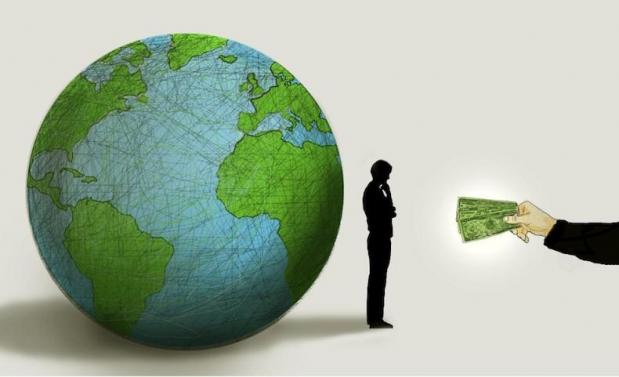A global minimum wage to reduce inequality
 Marianne/Tribune by Francis JOURNOT, published march 16, 2020 - In order to reduce inequalities, the "Patriotic Millionaires" collective proposes a taxation of the richest, which however does not seem to be unanimously supported. Could a reasonable global minimum wage project, which takes into account economic realities, be more convincing?
Marianne/Tribune by Francis JOURNOT, published march 16, 2020 - In order to reduce inequalities, the "Patriotic Millionaires" collective proposes a taxation of the richest, which however does not seem to be unanimously supported. Could a reasonable global minimum wage project, which takes into account economic realities, be more convincing?
 In a letter entitled Millionnaires against pitchforks signed in Davos by 121 personalities, the "Patriotic Millionaires" collective urges its millionaire and billionaire friends around the world to demand higher and fairer taxes in order to reduce "extreme and destabilizing inequalities". The initiative is generous, but it is doubtful whether it alone will significantly reduce poverty and the negative effects of low-cost production on the environment. Moreover, calls for accountability, however sincere, are rarely heeded. We should therefore try another approach to reach this goal, because the recommended philanthropy is obviously commendable, but the working poor, for their part, want a little more equity in the remuneration of their labor.
In a letter entitled Millionnaires against pitchforks signed in Davos by 121 personalities, the "Patriotic Millionaires" collective urges its millionaire and billionaire friends around the world to demand higher and fairer taxes in order to reduce "extreme and destabilizing inequalities". The initiative is generous, but it is doubtful whether it alone will significantly reduce poverty and the negative effects of low-cost production on the environment. Moreover, calls for accountability, however sincere, are rarely heeded. We should therefore try another approach to reach this goal, because the recommended philanthropy is obviously commendable, but the working poor, for their part, want a little more equity in the remuneration of their labor.
The International Convention for a Global Minimum Wage project, which was born in 2013, could provide solutions. Reasonable and progressive, it advocates pragmatism and recommends reintroducing balances upstream of economic mechanisms. Today, this could be the only way to both reduce inequalities in the world and the ravages of over-consumption on the environment. This global minimum wage, which would include several levels to take into account economic disparities, could be implemented in most countries in less than 7 or 8 years.
First Attempts
In the aftermath of the First World War, the world minimum wage became a priority and was one of the first projects of the ILO created in 1919 under the aegis of the Treaty of Versailles. Researchers were quick to identify the obvious first steps towards a world minimum wage based on a proportion of the median wage or income of each country (50 or 60% often cited) and the more or less similar Living Wage. But it is possible that ILO economists became aware of certain risks before the 1928 Convention. Indeed, taking into account a median wage, whether high or low, in the calculation of a local minimum wage does not guarantee that a State will then be able to cope in certain cases with an increase in the remuneration of its civil servants or that the rate of inflation that could be caused by a generalization of the minimum wage will be contained and will hardly aggravate situations of poverty. The danger of generating unrest and the bankruptcy of certain States has certainly tempered the desire for social progress and prompted caution. The Convention concerning the Creation of Minimum Wage-Fixing Machinery therefore left the signatory States free to decide: "Each Member which ratifies this Convention shall be free to determine the methods for determining minimum wages and the detailed rules for their application". 99 countries have ratified a convention that has not prevented inequalities from growing. The global minimum wage never saw the light of day and has been dormant ever since.
The danger of generating unrest and the bankruptcy of certain States has certainly tempered the desire for social progress and prompted caution. The Convention concerning the Creation of Minimum Wage-Fixing Machinery therefore left the signatory States free to decide: "Each Member which ratifies this Convention shall be free to determine the methods for determining minimum wages and the detailed rules for their application". 99 countries have ratified a convention that has not prevented inequalities from growing. The global minimum wage never saw the light of day and has been dormant ever since.
Failure of the European minimum wage
The idea of a European minimum wage has not been specifically theorised for the European Union by some eminent researcher or by a group of elected representatives, but has simply been inspired by the work of the ILO.  This political project emerged in the 1990s in order to enhance the social Europe dear to its founding fathers but has since come up against the structural disparities of the 27 countries of the European Union. Nevertheless, it is understandable that the governments of the lower-cost European countries, like their more distant competitors, are reluctant to raise wages and thus expose themselves to a reduction in their competitive advantage. It is therefore essential, in the context of globalisation, to include this issue in a broader process of global minimum wages.
This political project emerged in the 1990s in order to enhance the social Europe dear to its founding fathers but has since come up against the structural disparities of the 27 countries of the European Union. Nevertheless, it is understandable that the governments of the lower-cost European countries, like their more distant competitors, are reluctant to raise wages and thus expose themselves to a reduction in their competitive advantage. It is therefore essential, in the context of globalisation, to include this issue in a broader process of global minimum wages.
A structured concept for a global minimum wage based on concrete financial resources
In order to convince the countries concerned, a clear, realistic and economically structuring project should be proposed. If we consider that the question of financing the world minimum wage remains one of the main stumbling blocks for States, we must resolve to intervene only on wages that are likely to benefit from resources that allow it, first and foremost those of workers producing items for export. For example, a differentiated, gradual and programmed increase over several years in monthly wages, currently $25 in Ethiopia, $90 in Bangladesh, $170 in Vietnam or $300 in Bulgaria, would only impact the price of clothes sold most often to European or American consumers by a few tens of cents or even a few dollars on more expensive items. A timetable, based on comprehensive analyses, would prepare the conditions that would then enable international agreements to be signed. The EU and international institutions could share data or collaborate more widely on the basis of a common methodology. Partnerships with research departments of prestigious universities could also help to enrich this content. Positioning the cursor on minimum wage targets which might appear unambitious but which few countries could therefore refuse, would certainly not be likely to instantly change the living conditions of the 300 million working poor who live on less than $1.8 euros a day or of those who receive little more. On the other hand, this increase in remuneration, which would, however, initially concern only a part of the sectors of activity and populations, would secure this change and, above all, would make it possible to finally get a project for a world minimum wage on the rails, which should have 5 to 7 levels of compatibility.
A non-ideological project
Inequalities and "living wage" are part of the struggles or are favorite themes of NGOs which receive a financial windfall of several tens of billions of euros every year. But local actions can only partially solve these problems because the globalized economy requires us to think on a different scale first. The subjects of the global minimum wage and inequalities are, unfortunately, most often exploited for political, ideological or pecuniary ends. For many NGOs and medias (The Guardian, Jacobin, The Nation, the New Republic, Inequality, etc.), they constitute contents that tend to testify to their humanity or their commitment. But the extreme demands and the counter-productive publication of unrealistic ideological proposals, whose manicheism sometimes has nothing to envy to communism, provide arguments to the detractors of this cause which is thus discredited and immobilized. These opinion leaders, whose role-playing or lack of foresight can be regretted, ultimately do a disservice to those they claim to defend.
The subjects of the global minimum wage and inequalities are, unfortunately, most often exploited for political, ideological or pecuniary ends. For many NGOs and medias (The Guardian, Jacobin, The Nation, the New Republic, Inequality, etc.), they constitute contents that tend to testify to their humanity or their commitment. But the extreme demands and the counter-productive publication of unrealistic ideological proposals, whose manicheism sometimes has nothing to envy to communism, provide arguments to the detractors of this cause which is thus discredited and immobilized. These opinion leaders, whose role-playing or lack of foresight can be regretted, ultimately do a disservice to those they claim to defend.
After 7 or 10 years if we count the previous related work, the International Convention for a Global Minimum Wager project, noticed as early as 2013 by American academics, now benefits from a worldwide network of nearly 7,000 experts, most of whom are likely to be in agreement of the project or at least in favor of a reflection on the proposals put forward.  Most of them hold a PhD in economics or finance and several hundred of them wish to participate in the studies. Among them are many researchers and professors who teach in American Ivy League universities (Harvard, Yale, Columbia, Cornell...) or at Stanford, Berkeley, MIT and other prestigious schools around the world, but also nearly two thousand economists working in international institutions such as the UN, the WTO, the World Bank, the IMF, the World Economic Forum or the ILO as well as managers and financiers of large companies, banks or investment funds who know as we all do that increasing inequality can be dangerous.
Most of them hold a PhD in economics or finance and several hundred of them wish to participate in the studies. Among them are many researchers and professors who teach in American Ivy League universities (Harvard, Yale, Columbia, Cornell...) or at Stanford, Berkeley, MIT and other prestigious schools around the world, but also nearly two thousand economists working in international institutions such as the UN, the WTO, the World Bank, the IMF, the World Economic Forum or the ILO as well as managers and financiers of large companies, banks or investment funds who know as we all do that increasing inequality can be dangerous.
A global minimum wage offer that is difficult to refuse
So what leader of low-cost countries, inside or outside Europe, could publicly oppose a convention offering the opportunity for his fellow citizens working for export to the major, mainly Western, consumer markets to gradually benefit from better pay and living conditions that would mechanically, over the years, extend to all workers and then benefit the entire population without significantly affecting competitiveness if the increases are then coordinated on a global scale. Given the sectoral nature of these increases, they would not cause inflation to soar. Nor would the pact force governments to increase public spending, since the project is not based on a utopian and sudden general increase in wages. Environmental resources and natural habitat would be less strained. A generation tempted by immigration would discover new opportunities and sometimes choose to participate in local expansion. Supernatality exacerbates food insecurity, which today affects nearly one billion people worldwide. Thus, measures would often promote the education of children, the emancipation of women and, ultimately, a reduction in the birth rate and poverty. As the signatories of the Millionnaires against pitchforks letter warn, we must act before it is too late.
Francis JOURNOT is the initiator of the International Convention for a Global Minimum Wage project
Make a free website with emyspot - Signaler un contenu illicite sur ce site























